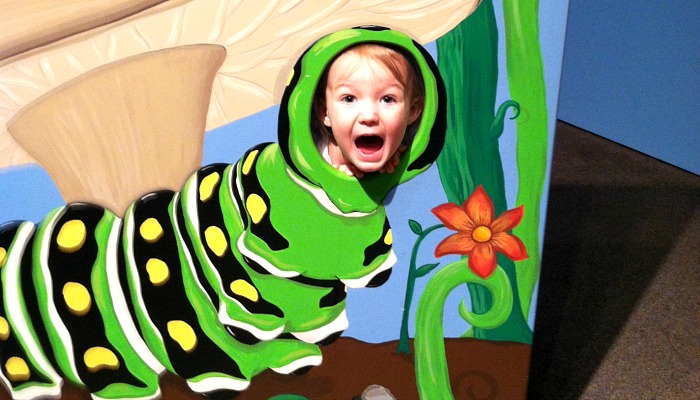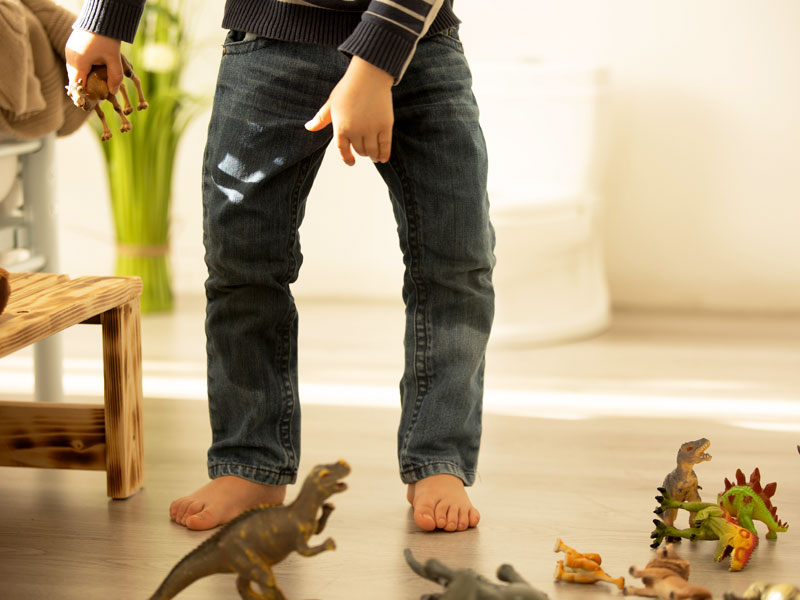I Almost Stopped Having More Kids After I Tried to Potty Train my First
Potty training my first child brought me to my knees. I had survived breast feeding struggles, fevers and toddler tantrums. Potty training was just another step in bringing up my daughter, right?
I was so wrong. I think potty training was the most despairing, exhausting part of parenting my kids! Messes everywhere. Frustration (on both sides). Monotony. Feeling like you couldn’t leave the house.
The good news? All three of my kids (yes, I was brave enough to have two more kids that would require potty training) were potty trained by age four. They figured it out.
Potty Training Tips From a Doc With Kids
University of Michigan Health-West pediatrician Dr. Mandy Potter knows a thing or two about potty training toddlers.
She’s potty trained two kids, both with very different processes.
And unfortunately, there is no silver bullet solution to potty training. No magic spell or motivational speech will convince a child to immediately begin using the toilet.
“Honestly the best advice I ever received came from my own mom and grandma: ‘they’ll do it when they’re ready’,” shares Dr. Potter.
“Not only is that my experience as a pediatrician and a mom, it’s backed by numerous studies.”

Think your child is ready to learn? Dr. Potter has seven tips for successful potty training.
1 – Determine if Your Kid is Ready to Learn Potty Training Yet
In general, most children are ready to train between ages two and three. This is when children develop an awareness of having to go to the bathroom and are able to stay dry for about two hours at a time.
Is your child physically capable of walking to the toilet, pulling their pants down, and getting on the toilet? Are they showing an interest in underwear and how a toilet works?
This is a great time to start the conversation about using the toilet. Read them books about it. Let them practice flushing. Let them watch siblings or a parent use the toilet so they can see what it’s all about.
2 – Be Positive
Now that your kid is ready, are you ready?
Cuz this is going to challenge you like you’ve ever experienced before. Start practicing a positive mindset.
“Kids learn best with praise rather than punishment,” advises Dr. Potter.
And while this seems like a no brainer, every parent of a potty training toddler will have their moments of sheer frustration. When you want to just scold your kid for peeing on the floor for a fifth time in a row.
This may be the biggest hurdle to overcome, but remind yourself to be patient and take deep breaths. Encourage that kid again and again. They’ll get there faster with a positive atmosphere.
3 – Be Consistent
“Consistency is important,” says Dr. Potter.
‘Have reasonable expectations within your child’s abilities, be clear with those expectations, and try to follow them every time.”
Your child won’t feel very confident if the rules keep changing. And a big spot where this happens is when multiple caregivers are involved.
Dr. Potter says to make sure that every caregiver is on the same page for potty training. This is anyone who will be taking care of your toddler during potty training – mom, dad, grandma, babysitter, child care provider.
If everyone can be consistent with the kid, maybe the kid can be consistent with success.
4 – Choose Your Strategy: And Then Be Ready to Adapt
Two common strategies for potty training are the slower child-led and the “do it in a day” bootcamp style.
Pick one, but hold it loosely. You may have to switch tactics.
“The strategies that worked yesterday may not work today as your child evolves,” says Dr. Potter. “Monitor progress and adapt as needed.”
Using the child-led strategy, parents gradually introduce the child to underwear and encourage them to use the potty as much they feel comfortable. The process may take longer, but it gives the child more control and allows them to take potty training at their own pace.
I wish I had heard of child-led before training my first. She refused to potty train under my great bootcamp plan and I couldn’t figure out why.
Then one day she said, “Mom, I do it myself!” and closed the door behind her in the bathroom. She was mad about potty training because I was hovering and she wanted me out of her hair. Bootcamp was cramping her style!
Bootcamp is more of a “ditch the diapers and potty training in one fell swoop” move.
Some parents who use this strategy take their child to the potty every 15-20 minutes to ensure there are as few accidents as possible. The kid gets used to going on the potty and the feeling of being dry and clean.
It all depends on the temperament of the child—and the parents—as to what works best for them.
5 – Choose Your Prizes – They May Not Be What you Expect
Kids light up when rewards are present. What will that look like for you?
You want to find something big enough to motivate them but not large enough to spoil their appetite or decide the reward is better than actually learning to use the potty.
Popular options are small toys, stickers or snacks.
But for some kids, traditional prizes mean nothing. My kids were unmoved by the promise of a sucker.
If you have one of those kids on your hands, don’t fret.
You can still give “prizes” but they just may not be tangible ones. My kids blossomed from praises for a good job. Calling Grandma when they made it to the potty on time. Telling dad when he got home about all their progress.
So that was our currency.
Maybe it’s doing a dance with your kid in the kitchen. Or singing a song with them. There are lots of “prizes” if you think outside the box.
6 – Gather Your Supplies, Including Lots of Extras: Underwear, Bedding and Cleaning Supplies
Prepare yourselves ahead of time with extra underwear, clean sheets and plenty of cleaning supplies. And keep cleaning supplies on each floor of your house.
It’s a lot less frustrating for us adults if we have all the tools we need to clean up an accident.
If your child isn’t staying dry at night, don’t be afraid to put them in a nighttime pullup and stick to daytime toilet training.
It gives them a little break at night from the stress of learning this new skill. It also gives YOU and your washing machine a break.
Decide whether you will use a kiddie toilet or the regular toilet with a kid seat. It’s purely preference – there’s no right or wrong way to do this.
My kids used the potty seat, but I have other friends who went with the whole kiddie toilet. And then kept it in the back of their van so they could avoid accidents when running errands. Smart move!
7 – Have Fun?
“Remember to have fun and enjoy this time,” says Dr. Potter.
This totally sounds bananas, but it’s true.
“Eventually nearly every child learns to use the toilet- your child will get there too! It can be frustrating, but remember that some day you will look back on this time and enjoy the funny moments along the way.”
I mostly cringe when I thinkg back on potty training my kids, but then I remember that time my kid pulled down their pants in Home Depot and tried climbing the display toilet because she had to go … and that’s a toilet, right??
Kids can be hysterical, even when potty training. So stay positive, and try to see the bright side of things!
Bedwetting is Common Until Age 6-7
Many children don’t stay dry overnight for months or years after they’re potty trained. It’s normal.
Bedwetting usually happens until about age 6 or 7.
If your kid is still regularly bed wetting after age seven, bring it up to your child’s pediatrician. It could still be normal, but sometimes constipation, urinary tract infections or other issues could be causing a problem.
When my kids got close to staying dry overnight, a couple of washable incontinence pads were my bffs. I’d tuck one in between the mattress pad and the fitted sheet and night time accidents were a breeze to clean up.
(And if the kid was suddenly having a wet streak, I just put the pad on top of the fitted sheet to save myself from stripping the bed every night at 1 AM.)
Refusing to Poop on the Toilet is Also Normal. Sorry.
A very common occurrence in potty training are kids that won’t poop on the toilet. It is mystifying to an adult that pooping one’s pants is preferred to the toilet, but it happens a lot.
Encouragement, patience and positive reinforcement are key here.
And don’t over look asking your child if it hurts to poop. They could be constipated.
Eventually, probably by age four, that kid will be potty trained! And it will be glorious.
Keep at it, give yourself and that cute kid of yours grace, and be ready to celebrate with a big treat once they get the hang of it.
University of Michigan Health – West
Multiple locations across West Michigan.
(800) 968-0051

Up Next
A Lot Happens to Your Body the First 24 Hours After you Give BirthAll the prepping in the world cannot completely prepare you for the post-birth experience.At least, that’s my…
I Almost Stopped Having More Kids After I Tried to Potty Train my First Potty training my first child brought me to my knees. I had survived breast feeding struggles,…
When I began to have pain during intercourse, I thought it was just something I’d have to bear.
But doctors say there IS help for these awkward female body issues…
The Baby Years are Just one Phase of Sleep Problems for Many Kids You survive the agonizing, endless years of a baby not sleeping well only to be faced with…
Expectant moms don’t fit into a box – we are all different, with different plans and hopes for our new baby. But we all share one thing in common: We…
Worrying about pain during labor and things that can go wrong is normal. We investigated common birth fears and learned that they actually happen very rarely.

